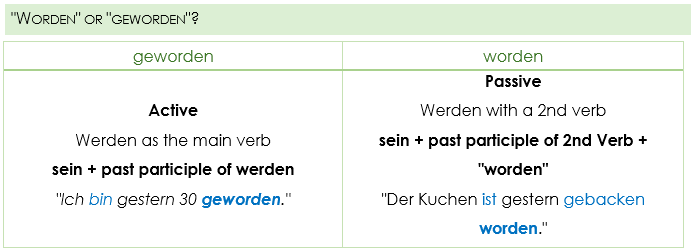„Werden“ is an important verb in German that is used in a number of different ways. It can be used as a main verb (meaning "to become") or as helping verb when constructing the future tense, passive voice, or subjunctive 2. This page talks about when and how to use „werden“, along with a number of examples.
Using „Werden“
The verb „werden“ can be used in different situations:

A Main Verb
Use with a noun:
- „Ich werde später Polizist.“
- „Du wirst bestimmt ein Feuerwehrmann.“
Use with an adjective:
- „Autos werden immer schneller.“
- „Dein Deutsch wird immer besser.“
As a main verb it means "to become".
As Auxiliary Verb
Future 1: „Ich werde morgen zu dir kommen.“
Passive: „Der Kuchen wird gebacken.“
Subjunctive 2: „Er würde gern Millionär sein.“
When „werden“ is used in these constructions, it doesn't have any meaning of its own. It is just used to signal what tense is being used. For more information on how to use „werden“ in these situations, look at the individual pages on the Future 1 , Passive and Subjunctive 2.
Recommendation: Tenses + Subjunctive 2
„Werden“ is used here to form the form, but has no meaning of its own. You can find out exactly how „werden“ is used as an Auxiliary verb in the individual forms in the presentations Future Tense 1, Passive and the Subjunctive 2.
Conjugating „Werden“

„Worden“ or „geworden“?
When do I use „worden“ and when „geworden“?
When using the Perfect Tense with „werden“ as the main verb (i.e. "He has become a teacher."), use „geworden“.
When using the Perfect Tense in the Passive voice (i.e. "The cake has been baked."), use „worden“.

Recommendation: The Passive
If you're new to the Passive voice, I recommend my lessons on the Passive voice:
Gramato: Your German Grammar Coach
Try Gramato now!
Powered by EasyDeutsch AI

This is how Gramato can help you!
Gramato helps you with all your German grammar questions – fast, to the point, and always based on the trusted content from https://easy-deutsch.com.
Gramato offers fill-in-the-blank exercises on a variety of grammar topics, tailored to your level so you can practice exactly what you need.
Get answers in multiple languages – German, English, Spanish, French, and more. That way, you can understand grammar in the language you feel most comfortable with.
Clear and simple grammar explanations – so you can learn faster and smarter with Gramato.
Ask your questions or practice anytime with Gramato – no wait, just results!
Related Topics:
Entire lesson in German only: Das Verb „werden”
You can find more lessons on Verbs here:
- Was sind Verben? (What are Verbs?)
- Starke Verben (Strong Verbs)
- „sein“ und „haben“ ("sein" and "haben")
- Reflexive Verben (Reflexive Verbs)
- Trennbare & Untrennbare Verben (Separable & Inseparable Verbs)
- Modalverben (Modal Verbs)
- Partizip 1 (Present Participle)
- Partizip 2 (Past Participle)
- Das Verb „lassen” (Verb "lassen")
- Imperativ (Imperative)
- Konjunktiv 1 (Subjunctive 1)
- Konjunktiv 2 (Subjunctive 2)
- Das Passiv (Passive Voice)
- Vorgangspassiv (Process Passive)
- Das Passiv in allen zeitformen (Process Passive in all tenses)
- Verben ohne Passiv (Verbs without Passive voice)
- Zustandpassiv (Status Passive)
- Das unpersönliche Passiv (Impersonal Passive)
- Verben mit Ergänzungen (Verbs with Complements)
- Verben mit Nominativ (Verbs with Nominative)
- Verben mit Akkusativ (Verbs with Accusative)
- Verben mit doppeltem Akkusativ (Verbs with double Accusative)
- Verben mit Dativ (Verbs with Dative)
- Verben mit Akkusativ & Dativ (Verbs with Accusative & Dative)
- Verben mit Genitiv (Verbs with Genitive)
- Verben mit Präpositionen (Verbs with Prepositions)
Lists on the topic of German verbs:
- Die 30 wichtigsten Verben mit Vokalwechsel (The 30 most important verbs with vowel change)
- Untrennbare Präfixe (Inseparable Prefixes)
- Wechselpräfixe (Two-case Prefixes)
- Unregelmäßige Partizip 2 Formen (Irregular Participle 2 forms)
- Nomen-Verb-Verbindungen (Noun-Verb compounds)
You can find an overview of all topics under German Grammar.
Recommendation: Free video lessons every Tuesday & Thursday
Sign up now: Email German Grammar course


